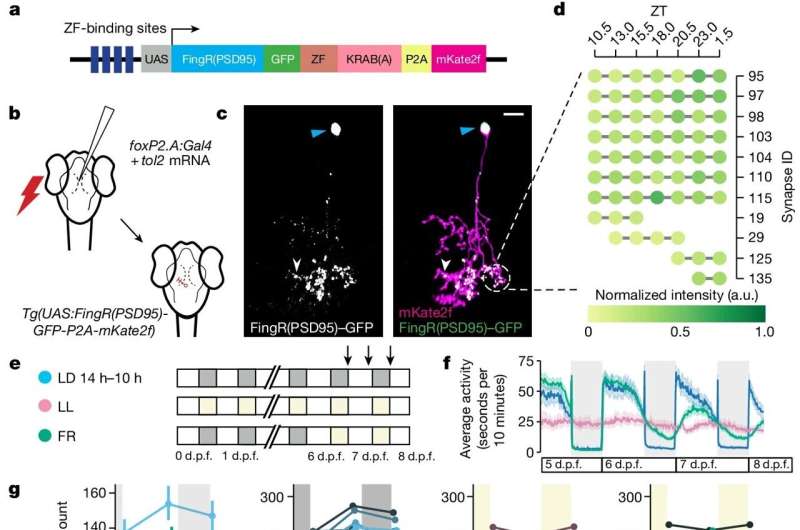Learn about brain health and nootropics to boost brain function
Scientists say sleep resets brain connections—but only for first few hours

Single-neuron synapse tracking across day–night cycles reveals diverse dynamics. Credit: Nature (2024). DOI: 10.1038/s41586-024-07367-3 During sleep, the brain weakens the new connections between neurons that had been forged while awake—but only during the first half of a night’s sleep, according to a new study in fish by UCL scientists.
The researchers say their findings, published in Nature , provide insight into the role of sleep, but still leave an open question around what function the latter half of a night’s sleep serves.
The researchers say the study supports the Synaptic Homeostasis Hypothesis, a key theory on the purpose of sleep which proposes that sleeping acts as a reset for the brain.
Lead author Professor Jason Rihel (UCL Cell & Developmental Biology) said, “When we are awake, the connections between brain cells get stronger and more complex. If this activity were to continue unabated, it would be energetically unsustainable. Too many active connections between brain cells could prevent new connections from being made the following day.
“While the function of sleep remains mysterious, it may be serving as an ‘off-line’ period when those connections can be weakened across the brain, in preparation for us to learn new things the following day.”
For the study, the scientists used optically translucent zebrafish, with genes enabling synapses (structures that communicate between brain cells) to be easily imaged. The research team monitored the fish over several sleep-wake cycles .
The researchers found that brain cells gain more connections during waking hours, and then lose them during sleep. They found that this was dependent on how much sleep pressure (need for sleep) the animal had built up before being allowed to rest; if the scientists deprived the fish from sleeping for a few extra hours, the connections continued to increase until the animal was able to sleep.
Professor Rihel added, “If the patterns we observed hold true in humans, our findings suggest that this remodeling of synapses might be less effective during a mid-day nap, when sleep pressure is still low, rather than at night, when we really need the sleep.”
The researchers also found that these rearrangements of connections between neurons mostly happened in the first half of the animal’s nightly sleep. This mirrors the pattern of slow-wave activity, which is part of the sleep cycle that is strongest at the beginning of the night.
First author Dr. Anya Suppermpool (UCL Cell & Developmental Biology and UCL Ear Institute) said, “Our findings add weight to the theory that sleep serves to dampen connections within the brain, preparing for more learning and new connections again the next day. But our study doesn’t tell us anything about what happens in the second half of the night.
“There are other theories around sleep being a time for clearance of waste in the brain, or repair for damaged cells—perhaps other functions kick in for the second half of the night.”
Provided by University College London
Read more at medicalxpress.com